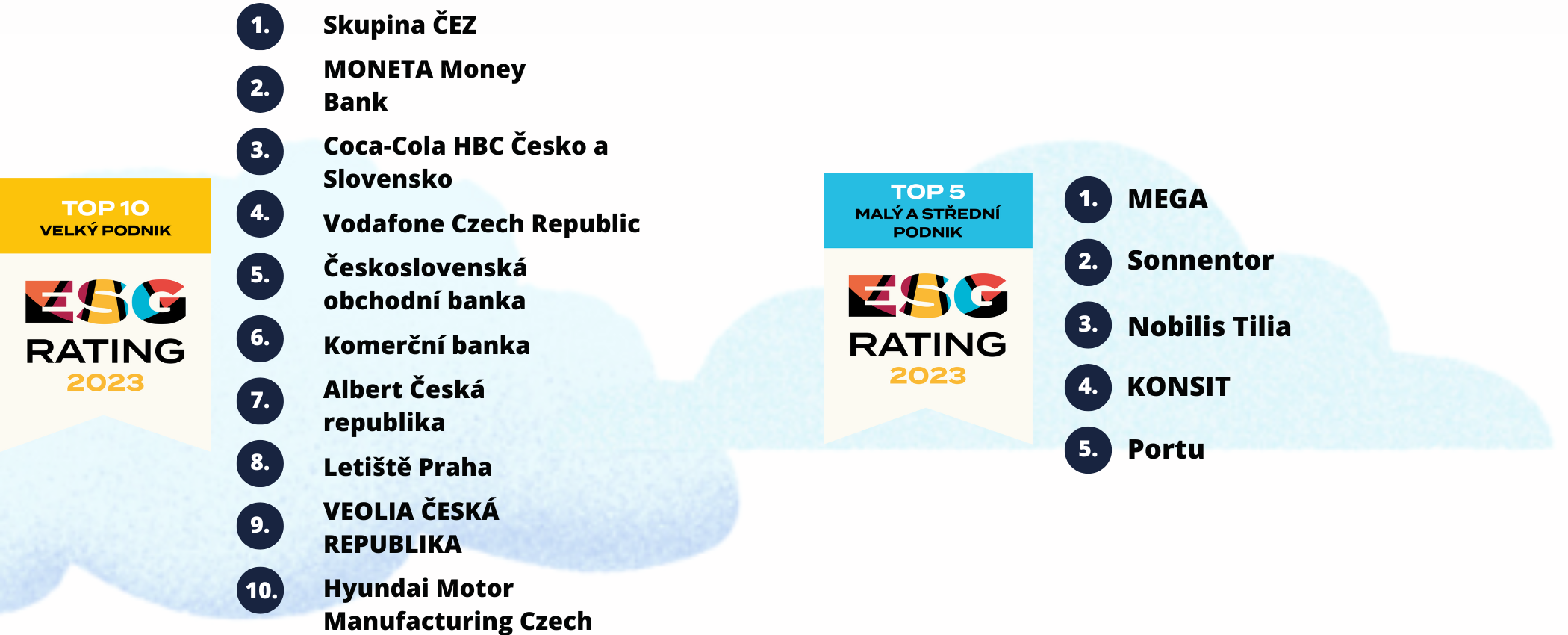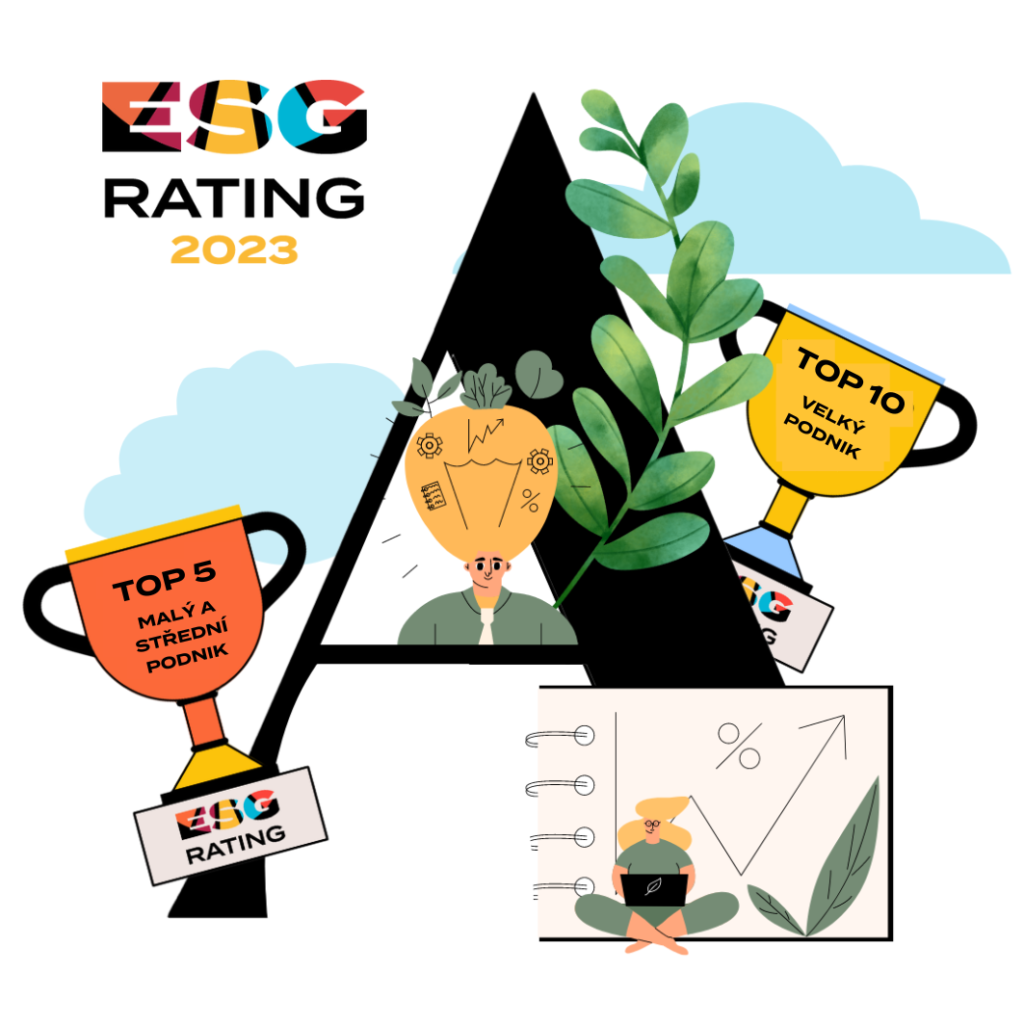ESG Rating: Which companies ranked among the best based on sustainability and ESG?
11/3/2023
The second annual unique independent comparison of Czech companies based on ESG examined the extent to which domestic firms monitor and communicate their impact on the environment, society, and corporate governance. The ESG Rating – ranking of the best in the large enterprise and small and medium enterprise categories – is the result of a roughly six-month combined research effort. It was compiled by the CEMS program of the Faculty of Business and Economics at the University of Economics in Prague in collaboration with the Association of Social Responsibility.
Interest in the expert comparison of ESG strategies in the autumn ranking increased by 55% compared to last year. “For both the public and the business world, presenting the TOP 10 large and TOP 5 small and medium-sized enterprises with transparent and meaningful ESG principles is valuable information. Changes in legislation and mandatory non-financial reporting are on the horizon, and the Rating will not only show companies their position compared to competitors but will also serve as a stepping stone and foundation for further improvement for those less experienced or prepared,” explained Lucie Mádlová, director and founder of the Association of Social Responsibility. This is why this year’s questionnaire was adjusted to reflect relevant topics for both categories, as they may differ.
Ladislav Tyll, an expert in international corporate strategies from the Faculty of Business and Economics at the University of Economics, and academic director of the CEMS program, responsible for the methodology and evaluation of the ESG Rating, stated, “In the ESG Rating, companies score points for being detailed, careful, data-focused in their ESG, and transparent in communicating their reports to the public.”
Among small and medium-sized enterprises, Mega took the first place, while among large enterprises, ČEZ Group secured the top position. “We began publishing our activities in social responsibility in 2007, and since 2016, we have been reporting progress in sustainable development according to international GRI standards. Gradually, we have included a range of other international metrics and standards in our reporting to compare ourselves with top foreign players, and we continue this trend now. We aim to stay one step ahead – monitoring trends and implementing them ahead of time before they become mandatory. We value transparency and completeness in reporting. Therefore, I am pleased that the results of this year’s ESG Rating 2023 confirm our position as a leader. I appreciate this even more because it is based on a truly thorough research conducted by an independent third party using the comprehensive CEMS program,” described Michaela Chaloupková, a board member and director of the ČEZ Management Division.
For the complete ranking, including profiles of the ranked companies, please visit the ESG Rating website.
Best Social Enterprise
In this year’s ESG Rating, social enterprises also had the opportunity to showcase their efforts, with FOVY ranking highest among the applicants. FOVY focuses on working with people with mental illness or other disabilities. Located in Hlinsko on the Vysočina highlands, it employs nearly 200 individuals in seven facilities. They work primarily in the forest, maintain greenery, produce ceramics, sew, clean, and are involved in various activities. FOVY is also active in the gastronomy sector, operating under the brand Čistá duše (Clean Soul). For FOVY, it is important that its operations are not only beneficial but also successful, serving as equal partners among competitors for its customers, including private individuals, commercial sectors, and public institutions.
ESG v zapojených firmách v číslech
There is a significant difference in the experience of large and small and medium-sized companies regarding the disclosure of non-financial indicators. The Rating revealed that 61% of large companies issue sustainability-focused reports, while only 22% of smaller businesses address sustainability in any documents. Lucie Mádlová commented, “at the same time, 71% of large companies use the Sustainable Development Goals (SDGs) as a basis for formulating their sustainability strategies, and small and medium-sized enterprises are not lagging behind.” She added that when the idea of the ESG Rating was conceived, one of the goals was and still is to help these companies navigate ESG and establish effective and long-term processes.
“Roughly one-third of large companies have ESG directly under the supervision of the CEO, which is unusual compared to foreign practices. Several Czech companies have already started creating Chief Sustainability Officer (CSO) positions, following the example of foreign companies,” added Ladislav Tyll. The Rating also confirmed that the size of the company directly impacts the quality and depth of reporting. Smaller companies generally have limited resources, including the ability to hire specialists or lower knowledge of sustainability-related topics. Conversely, these companies score higher than large enterprises in the social category, often paying increased attention to their employees and local communities with whom they maintain personal contact.
“Visa is not just a payment company; it is a network connecting consumers, financial institutions, and merchants worldwide. We strive to leverage the opportunities we have in the broader payment ecosystem to help kickstart sustainable business. As part of our mission, we support sustainable business practices,” said Hana Wasserburger, Director of Advisory Services for Visa in the Czech Republic, Hungary, and Slovakia. Visa became the general partner of the ESG Rating for the year 2023.

The basis for the analysis was this year’s questionnaire, which differed in scope and content for both categories. It reflected the most relevant topics for them and approached the future mandatory ESG report. In the environmental category (E), for example, it evaluated how a company approaches pollution, energy consumption, or waste and water management. In the social category (S), evaluators monitored the company’s approach to diversity among employees and their rights. In the governance category (G), the survey focused on how transparently the company communicates its business model or how effectively it monitors ESG-related risks.




